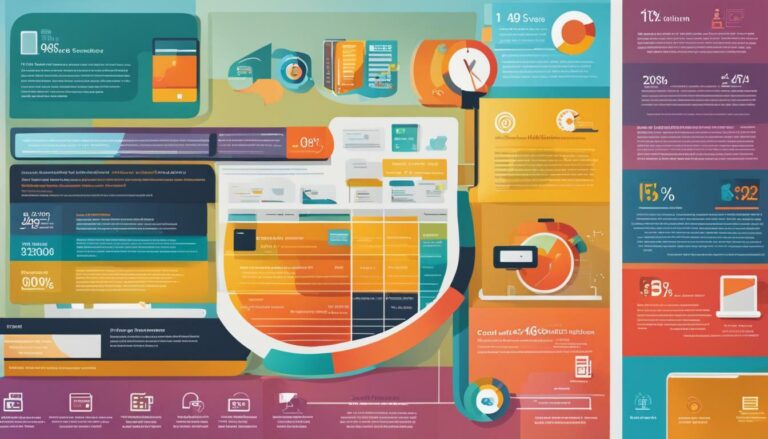Tips for Navigating Credit after a Major Life Change

Navigating your credit after experiencing a major life change is crucial for maintaining financial stability and healthy credit scores. Whether you’ve gone through a divorce, changed careers, faced medical challenges, or graduated and started a new chapter in life, managing your credit during these transitions is essential.
In this article, we will provide you with valuable tips to help you navigate credit after a major life change. By following these strategies, you can take control of your credit situation and build a solid foundation for a healthy financial future.
🚨 TUIC Errors + Low Credit Score?
CreditScoreIQ helps you build credit faster by reporting utility bills to all 3 bureaus—while you dispute errors.
Start Building Credit Today →Key Takeaways:
- Review and clean up your credit report to ensure accuracy and dispute any errors you find.
- Pay off debt, especially credit card debt, to improve your credit score.
- Maintain a low credit utilization rate by keeping your total debt below 10% of your total credit limit.
- Enjoy the benefits of cleaning up your credit, such as increased approval odds for credit cards, loans, and mortgages, better interest rates, and greater financial stability.
- Consult with a certified financial counselor to receive personalized advice tailored to your specific situation.
Now that you understand the importance of managing credit after a major life change, let’s dive into the specific tips and strategies that will help you navigate this process successfully.
Review and Clean Up Your Credit Report
The first crucial step in navigating credit after a major life change is to thoroughly review and clean up your credit report. Request your credit reports from all three major credit bureaus – Experian, Equifax, and TransUnion, and carefully examine them for any inaccuracies or errors. These could include incorrect personal information, outdated accounts, or even fraudulent activity. Disputing any errors you find is essential to ensure that your credit report is accurate and reflects your current financial situation. Remember, a clean credit report is the foundation for managing credit effectively during major life changes.
To effectively clean up your credit report, start by scrutinizing each section of the report. Check your personal information, including your name, address, and social security number, to make sure everything is accurate. Any incorrect information could potentially harm your credit score or lead to identity theft.
| Key Points | Action Steps |
|---|---|
| Check for inaccuracies | Review your credit report and look for any errors or incorrect information. If you find any, dispute them with the credit bureaus. |
| Dispute errors | Contact the credit bureaus in writing and provide evidence to support your dispute. They are required by law to investigate and correct any inaccuracies. |
| Ensure accurate personal and account information | Double-check that your personal information and account details are correct, such as your address, social security number, and account balances. |
By making sure your credit report is accurate, you can have a clear understanding of your financial standing and take the necessary steps to manage credit during major life changes. Remember, it’s important to regularly monitor your credit report and keep it updated to stay on top of your credit health.

In addition to reviewing your credit report, it’s crucial to understand your credit score. Your credit score is a numerical representation of your creditworthiness and is used by lenders to assess your credit risk. It is based on information in your credit report, such as your payment history, credit utilization, length of credit history, and other factors.
A higher credit score demonstrates responsible credit management and makes it easier to qualify for loans, credit cards, and favorable interest rates. To improve your credit score, focus on paying bills on time, reducing debt, and maintaining a low credit utilization ratio.
“Your credit score is a reflection of your financial responsibility and can greatly impact your ability to secure credit during major life changes.”
Keep in mind that credit scores may fluctuate over time, so it’s important to regularly check your score and take steps to improve it if necessary. Working towards a higher credit score can provide financial stability and open doors to better credit opportunities.
Pay Off Debt
Clearing your credit card debt is a vital step in rebuilding your credit after a significant life change. The weight of outstanding debt can negatively impact your credit score and make it harder to secure loans or credit in the future. However, by taking proactive steps to pay off your debt, you can improve your creditworthiness and regain financial stability.
One strategy to consider is transferring your credit card balances to a card with a lower interest rate or utilizing a personal loan to consolidate your debt. This can help you save on interest charges and make it easier to manage your payments. Additionally, consider using any rewards you have accumulated to help reduce your outstanding balance. Every little bit counts when it comes to paying down debt.
Creating a budget and sticking to it can also be instrumental in paying off debt. Identify areas where you can cut back on expenses and allocate those savings towards your debt payments. By prioritizing debt repayment in your budget, you can make steady progress towards becoming debt-free and improving your credit score.
Table: Debt Repayment Plan
| Debt Type | Outstanding Balance | Monthly Payment |
|---|---|---|
| Credit Card 1 | $5,000 | $200 |
| Credit Card 2 | $3,000 | $150 |
| Personal Loan | $10,000 | $300 |
| Total | $18,000 | $650 |
By creating a debt repayment plan like the one shown above, you can visualize your progress and stay motivated to pay off your debts. Remember, consistency is key. Stick to your plan and make timely payments to not only reduce your debt but also rebuild your credit after a major life change.

Remember to seek professional financial advice if you need help tailoring these credit steps to your specific circumstances. A certified financial counselor can provide personalized guidance based on your financial goals and help you navigate the challenges of rebuilding credit after a significant life change or career transition.
Maintaining a low credit utilization rate is crucial when it comes to managing credit during major life changes. This strategy involves keeping your credit card balances below a certain percentage of your total credit limit, typically below 10%. By doing so, you can positively impact your credit score and improve your overall financial health.
One effective way to achieve a low credit utilization rate is by paying off your credit card debt. This can be done through various methods such as balance transfers, consolidating debt with a personal loan, or even redeeming rewards to help pay off the balance. By reducing your credit card debt, you not only decrease your credit utilization ratio but also demonstrate responsible financial behavior, which lenders appreciate.
Additionally, it is important to regularly review and clean up your credit report. Request your credit reports from all three major credit bureaus and carefully examine them for any inaccuracies. Dispute any errors you find and ensure that your personal and account information is correct. This step is crucial in maintaining an accurate credit history and preventing any potential negative impacts on your credit score.
By maintaining a low credit utilization rate, you can enjoy a range of benefits. A clean credit report and a good credit score can increase your approval odds for credit cards, loans, and mortgages. It also qualifies you for better interest rates, which can ultimately save you money on interest charges. Moreover, having good credit provides greater financial stability and opens up opportunities for financial growth.
In summary, managing credit during major life changes requires careful attention to the utilization of your available credit. Maintaining a low credit utilization rate is a powerful strategy that can positively impact your credit score and overall financial well-being. By responsibly paying off debt, regularly reviewing your credit report, and reaping the benefits of good credit, you can navigate credit successfully during life transitions.
| Credit Management Tips for Major Life Changes |
|---|
| Review and clean up your credit report |
| Pay off debt |
| Maintain a low credit utilization rate |
| Benefits of cleaning up your credit |
Benefits of Cleaning Up Your Credit
Cleaning up your credit after a major life change brings numerous benefits that can positively impact your financial future. By taking proactive steps to review and manage your credit, you can improve your creditworthiness, increase your chances of obtaining credit cards, loans, and mortgages, and qualify for better interest rates.
One of the key advantages of cleaning up your credit is the increased likelihood of approval when applying for credit. Lenders typically assess creditworthiness based on credit history and credit scores. A clean credit report and a good credit score demonstrate your ability to manage debt responsibly, giving lenders confidence in your ability to repay borrowed funds. This not only increases your chances of approval but may also open up access to higher credit limits and better credit card rewards programs.
Additionally, maintaining a clean credit report and a good credit score can lead to significant savings on interest charges. When you have a solid credit profile, lenders are more likely to offer you lower interest rates on credit cards, loans, and mortgages. This can save you thousands of dollars over time, allowing you to allocate those funds towards other financial goals, such as building an emergency fund or saving for retirement.
Lastly, having a clean credit report and a good credit score provides you with greater financial stability. During major life changes, such as a significant medical event or starting a new chapter as a recent graduate, having a strong credit profile can offer a sense of security. It ensures you have access to credit when needed and allows you to navigate financial challenges more effectively.

In summary, cleaning up your credit after a major life change is a vital step towards financial success. It can boost your creditworthiness, increase your approval odds, qualify you for better interest rates, save you money on interest charges, and provide you with greater financial stability. Remember, it is important to consult with a certified financial counselor to tailor these tips to your specific financial situation.
Seeking Professional Financial Advice
For a personalized approach to managing your credit during major life changes, it is advisable to seek professional financial advice. A certified financial counselor can provide invaluable guidance tailored to your specific financial situation. They can help you navigate credit challenges and develop a strategy to rebuild your credit after significant life events, such as a career change or starting a new chapter as a recent graduate.
By consulting with a professional, you can gain a deeper understanding of your credit report and how it impacts your financial future. They will help you review your credit reports from all three major credit bureaus and identify any inaccuracies or errors that may be negatively affecting your credit score. This attention to detail is crucial in ensuring the accuracy of your credit history and maximizing your opportunities for credit approval.
In addition, a financial counselor can assist you in creating a plan to pay off debt and improve your credit utilization rate. They can provide insights into various debt repayment strategies and help you prioritize which debts to tackle first. By taking proactive steps to reduce your overall debt and maintain a low credit utilization rate, you can boost your credit score and position yourself for better financial stability.
Remember, managing credit during major life changes can be complex, and seeking professional guidance can save you time, money, and unnecessary stress. A certified financial counselor has the knowledge and experience to guide you through the process, providing you with the confidence and tools you need to navigate credit successfully.

Navigating credit after a major life change requires diligence and proactive steps, but the rewards of rebuilding and maintaining healthy credit scores are well worth the effort. By following these tips, you can take control of your credit and improve your financial well-being.
First and foremost, it’s essential to review and clean up your credit report. Request your credit reports from all three major credit bureaus and carefully check for inaccuracies. Dispute any errors you find and ensure that your personal and account information is correct. This step is crucial in establishing a solid foundation for managing your credit.
Next, pay off any existing debt to improve your credit score. Consider strategies such as balance transfers, consolidating debt with a personal loan, or even redeeming rewards to help pay off your credit card balances. This will not only reduce your debt burden but also demonstrate responsible financial behavior to lenders.
Additionally, maintaining a low credit utilization rate is key. Keep your credit utilization rate below 10%, which means using only a small portion of your total credit limit. This shows lenders that you are using credit responsibly and can have a positive impact on your credit score.
Finally, cleaning up your credit after a major life change can provide numerous benefits. A clean credit report and good credit score increase your chances of getting approved for credit cards, loans, and mortgages. They can also qualify you for better interest rates, saving you money on interest charges. Furthermore, having healthy credit scores can provide greater financial stability, giving you peace of mind as you navigate through life’s transitions.
Remember, it’s important to consult with a certified financial counselor who can provide personalized guidance tailored to your specific financial situation. With their expertise and these tips in mind, you can regain control of your credit after a significant life change and pave the way for a brighter financial future.
FAQ
Q: What should I do if I find inaccuracies on my credit report?
A: If you find inaccuracies on your credit report, you should dispute the errors and ensure your personal and account information is correct. Contact the credit bureaus and provide supporting documentation to back up your claims.
Q: How can I pay off my credit card debt to improve my credit score?
A: To pay off credit card debt and improve your credit score, consider strategies such as balance transfers, consolidating debt with a personal loan, or utilizing credit card rewards to help pay off the balance. Create a budget and allocate extra funds towards paying off debt.
Q: What is a credit utilization rate, and why is it important?
A: Credit utilization rate is the percentage of total debt compared to your total credit limit. It is important to maintain a low credit utilization rate, preferably below 10%, as it can help improve your credit score. To keep your credit utilization rate low, avoid maxing out your credit cards and pay off debt regularly.
Q: What are the benefits of having a clean credit report and good credit score?
A: Having a clean credit report and good credit score can increase your approval odds for credit cards, loans, and mortgages. It may also qualify you for better interest rates, saving you money on interest charges. A strong credit score can provide greater financial stability and opportunities for financial growth.
Q: Do I need to seek professional financial advice when managing credit after a major life change?
A: It is highly recommended to seek professional financial advice when managing credit after a major life change. A certified financial counselor can help tailor credit management strategies to your specific situation and provide personalized guidance on rebuilding and improving your credit.
Ready to Improve Your Credit?
Disputing TUIC errors is step one. Step two? Boost your score by reporting utility payments with CreditScoreIQ.
Get Started Now (Only $1 Trial) →3-bureau reporting • $1M identity insurance • Dark web monitoring






